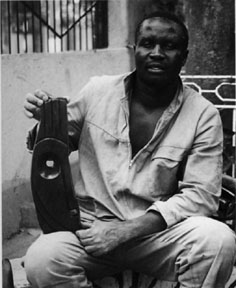![]()
![]()
[ The following essay has been adapted with the kind permssion of the Director, Chapungu Sculpture Park, from Chapungu: The Stone Sculptures of Zimbabwe (1995). All images © Chapungu Sculpture Park, Harare.]
 Richard was born in Harare in l947, the brother of renowned | first generation sculptor Boira Mteki, it was actually through | his elder brother that Richard came to sculpt. Initially he | enrolled at the Nyarutsetso Art Centre which had been established by the late Cannon Paterson and it was here he began to sculpt full time. Inspired by the work which was being produced at the Workshop School of the National Gallery, Mteki left the Nyarutsetso Art Centre and joined Frank McEwen and the group of sculptors at the National Gallery. When McEwen resigned in 1973, Mteki left the Workshop School and has worked independently since then.
Richard was born in Harare in l947, the brother of renowned | first generation sculptor Boira Mteki, it was actually through | his elder brother that Richard came to sculpt. Initially he | enrolled at the Nyarutsetso Art Centre which had been established by the late Cannon Paterson and it was here he began to sculpt full time. Inspired by the work which was being produced at the Workshop School of the National Gallery, Mteki left the Nyarutsetso Art Centre and joined Frank McEwen and the group of sculptors at the National Gallery. When McEwen resigned in 1973, Mteki left the Workshop School and has worked independently since then.
A sculptor of some standing, Mteki's work has been acclaimed both locally and internationally. In 1986 Mteki was commissioned by the Zimbabwean Government to create a piece for the National Sports Stadium in Harare, a Zimbabwe bird. This is a massive piece which lightly rests on its huge base as if preparing to fly, all beak and powerful talons this is a bird of prey ready to claw its way through the sky. That was not the only time his work was chosen by the Governrnent, in 1982 one of his pieces was selected as the gift to be presented to the Nigerian head of state by President Mugabe on his official visit to that country. In 1984 the Government once again selected Mteki's work, on this occasion the piece was presented to the late Rajiv Gandhi on the opening of the Non Aligned Movement summit in Harare.
Mteki's sculptures are generally peaceful, they do not disturb but rather leave the viewer feeling calm and content. His work is filled with a gentle spiritual presence, usually small and compact their message is much larger than their scale. Having been sculpting for over 25 years Mteki is a master of stone carving, the strength and fluidity of his lines constantly bear witness to his experience. Typically classed Mteki is a first generation sculptor drawing on the beliefs of the Shona man for the majority of his subject matter, although he is also inspired by nature occasionally depicting animals in his own distinctive style. The shape of the raw stone is important to Mteki, he chooses to work with the stone rather than impose his will upon it. A dedicated conservationist and deeply concerned about the plight of the rhino he participated in the Rhinowatch exhibition in London in 1994 and donated the money from the sale of one of his pieces to a conservation fund. He possesses a strong social conscience and is eager to instruct younger aspiring sculptors in the methods of stone sculpting, just as he was shown as a young man. Mteki feels this is necessary as with out proper instruction there is no future, he always encourages the youngsters to strive for their own style and not simply to imitate others.
Earlier this year Mteki was invited to join the artists residency programme at Chapungu Sculpture Park as a tribute to the years of support he has give to the arts of Zimbabwe. Already he has produced some important work, most notably The Stork Family (1997). At 50 years of age Richard shows no signs of slowing down and his work goes from strength to strength.
Mawdsley, Joceline. Chapungu: The Stone Sculptures of Zimbabwe. Harare: Chapungu, 1997.